Goodbye to the consummate politician

Jeremy Hunt’s ability to avoid the pitfalls of cabinet reshuffles has been reminiscent of an action-adventure film. There were times he looked destined for the chop yet still retained his health brief – in one instance, even adding social care to his title.
He became the longest running health secretary, and claimed that it was his last big job in politics. Yet now he is in one of the great offices of state as foreign secretary.
This shouldn’t be a surprise to anyone. Because, whatever you think of him, you cannot deny that Hunt is the consummate politician.
He must be one of the only people in the UK who voted ‘Remain’ in the referendum, but has since been so convinced by the Government’s attempts to leave the EU that he would now vote ‘Leave’. Which, of course, is the winning team.
This approach can be seen throughout his time as health secretary. He was striving for improved patient safety to be his legacy. Which is a noble cause. But it is also a popular one and – with the Mid Staffs scandal happening under the Labour Government – a palatable one politically.
It’s easy to be cynical about his motivations. Because patient safety took a back seat when it came to shinier new policies. The GP profession consistently warned about the dangers of shifting very limited resources into seven-day routine services, but this was a policy that he felt played well with the electorate – so trumped such concerns.
He was happy to make enemies with the medical profession if he felt it was a fight he could win in terms of public opinion. Most obviously there was the junior doctor contract dispute, but also his blaming of GPs for the apparent lack of out-of-hours care and the resulting pressures on A&E.
Yet in these last few months, we have seen a slight change in Hunt. It may be that he truly believed this was his last big job in politics, but he started to take on less fashionable causes. He embraced the importance of improving social care – which isn’t always a vote winner.
And, most surprisingly, he criticised the GMC for taking Dr Hadiza Bawa-Garba to High Court to strike her off the register. Again, not something that would necessarily register well with his core support.
So how to evaluate his reign? There is little doubt that general practice is in a far worse state than when he started. He’s failed to recruit the GPs needed, the workload is intolerable and practices are closing at a faster rate than ever before.
But, by his own standards, it’s been a success. He’s remained in one of the top jobs in Government since 2012, and is now in the third biggest job in government. For the consummate politician, things could hardly have gone better.
Jaimie Kaffash is editor of Pulse











